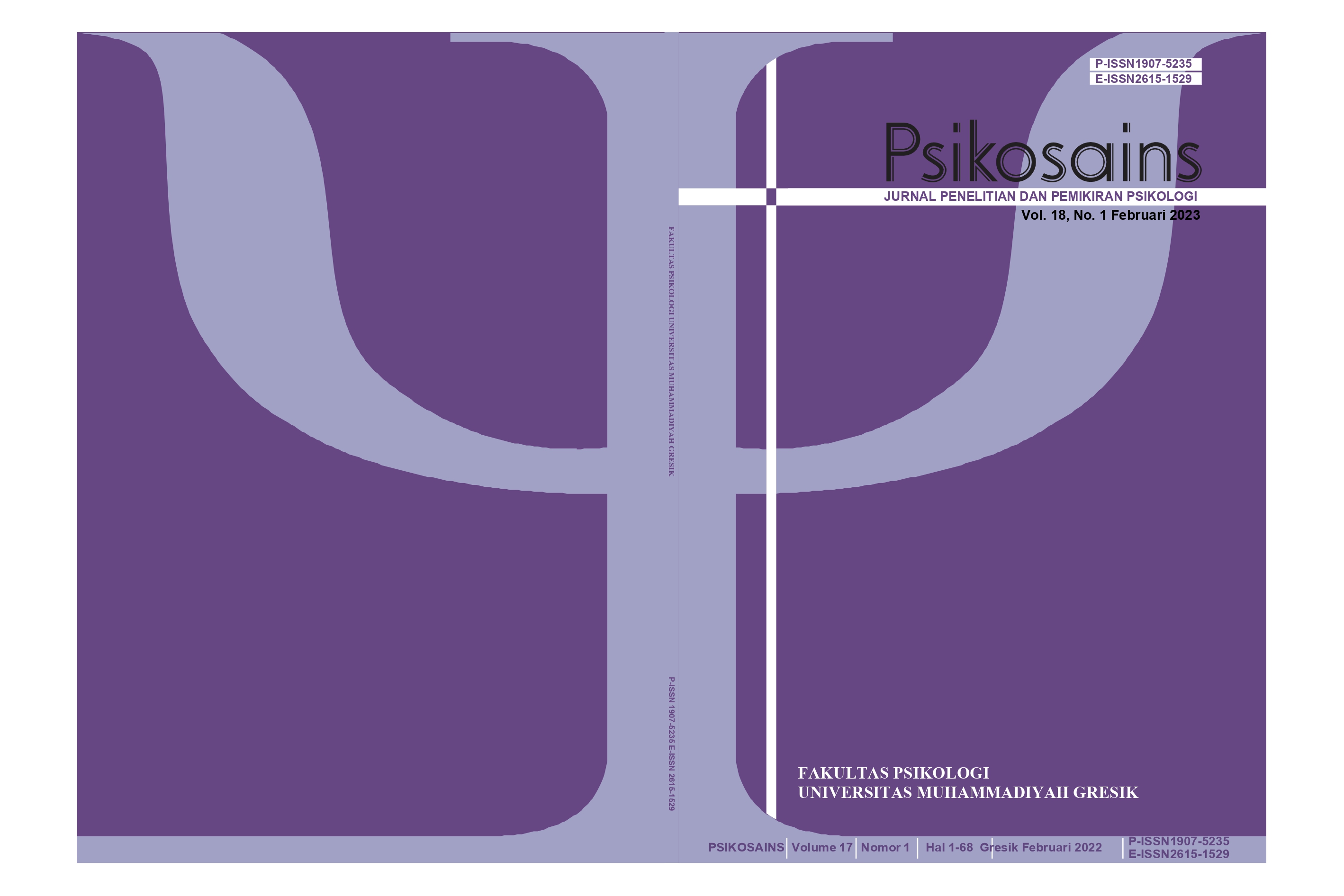Pengaruh Pet Attachment Terhadap Psychological Well Being Pemilik Hewan Peliharaan Di Kota Gresik
DOI:
https://doi.org/10.30587/psikosains.v18i1.5314Keywords:
Pet Attachment, Psychological Well Being, Pet OwnersAbstract
Keeping pets is a hobby for many people and having an attachment to pets is also considered beneficial for their owners. This study aims to determine the effect of Pet Attachment on Psychological Well Being. This research uses quantitative methods. Determination of the sample using incidental sampling technique, as many as 105 respondents. Research data were collected by distributing questionnaires on the Pet Attachment Questionnaire (PAQ) scale developed by Zilcha-Mano, Mikulincer dan Shaver (2011) and the Psychological Well Being scale developed by Ryff (1989). The analytical method used is simple linear regression analysis. The results of the analysis using a simple linear regression test get a sig value of 0.311, meaning that the significant value is more than > 0.05. So it can be concluded that there is no significant effect between Pet Attachment on the Psychological Well Being of pet owners in Gresik City.
References
Azwar, S. (2015). Reliabilitas dan Validitas . Yogyakarta: Pustaka Pelajar.
Bowlby, J. (1982). Attachment and Loss Volume 1. New York: Basic Books.
Bradburn, M. N. (1969). The Structure of Psychological Well-Being. Chicago: Aldine Publishing Company.
Brown, S. & Katcher, A.H. (2001). Pet Attachment and Dissociation. Society & Animals, 9(1), 25-41.
Erpiana, A. & Fourianalistyawati, E. (2018). Peran Trait Mindfulness terhadap Psychological Well-Being Pada Dewasa Awal. PSYMPATHIC : Jurnal Ilmiah Psikologi, 5(1), 67-82.
Eva, N., Shanti, P., Hidayah, N. & Bisri, M. (2020). Pengaruh Dukungan Sosial terhadap Kesejahteraan Psikologis Mahasiswa dengan Religiusitas sebagai Moderator. Jurnal Kajian Bimbingan dan Konseling, 5(3), 122-131.
Fine, A. H. (2019). The Human-Animal Bond Over The Lifespan: A Primer for Mental Health Professionals. In Clinician’s Guide to Treating Companion Animal Issues. California: Elsevier, Inc.
Hafizhah, D. N. & Hamdan, S.R. (2021). Hubungan Pet Attachment dengan Psychological Well-Being pada Pemelihara Kucing kota Bandung. Prosiding Psikologi, 7(1), 73-76.
Hardani. (2020). Metode Penelitian Kualitatif & Kuantitatif. Yogyakarta: CV Pustaka Ilmu.
Herzog, H. (2011). The Impact of Pets on Human Health and Psychological Well Being: Fact, Fiction, or Hypothesis?. Current Directions in Psychological Science, 20(4), 236-239.
Imanina, F. N. (2022). Hubungan antara Pet Attachment dengan Kesepian pada Dewasa Awal Lajang yang Merantau. Buletin Riset Psikologi dan Kesehatan Mental, 2(1), 315-323.
Kurdek, L. A. (2009). Pet Dogs as Attachment Figures for Adult Owners. Journal of Family Psychology, 23(4)439-446.
Laili, R. A. (2021). Pet Attachment Sebagai Strategi Koping untuk Mengurangi Stres Akademik pada Mahasiswa di Masa Pandemi Covid-19. Skrispi. Malang: Universitas Muhammadiyah Malang.
Levinson, B. M. (1969). Pet-oriented Child Psychotherapy. Springfield, IL: Charles C. Thomas.
Rachmayani, D. R. (2014). Adaptasi Bahasa dan Budaya Skala Psychological Well Being. Proceeding: Seminar Nasional Psikometri, 253-268.
Rockett, B. & Car, S. (2014). Animals and Attachment Theory. Society and Animals, 22(4), 415-433.
Ryff, C. D. (1989). Happiness Is Everything, or Is It? Explorations on the Meaning of Psychological Well-Being. Journal of Personality and Social Psychology, 57(6), 1069-1081.
Ryff, C. D. (1995). The Structure of Psychological Well Being Revisited. Journal of Personality and Social Psychology 69(4), 719-727.
Rynearson, E.K. (1978). Humans and Pets and Attachment. The British Journal of Psychiatry, 133, 550-555.
Sugiyono. (2016). Metode Penelitian Kuantitatif, Kualitatif, dan R&D. Bandung: Penerbit Alfabeta.
Tan, J.S.Q., Fung, W., Tan, B.S.W., Low, J.Y., Syn, N.L., Goh,Y.X. & Pang, J. (2021). Association between pet ownership and physical activity and mental health during the COVID-19 “circuit breaker” in Singapore. One Health, 13, 1-8.
Tanjung, A. A. (2018). Studi Identifikasi Faktor-Faktor yang Maempengaruhi Psychological Well-Being pada Lansia di Panti Jompo Yayasan Guna Budhi Bakti Medan. Skripsi. Medan: Fakultas Psikologi Universitas Medan Area.
Tyrestafani, R. & Soetjiningsih, C.H. (2022). Hubungan Pet Attachment dengan Psychological Well-Being pada pemilik kucing dan anjing di Semarang. Jurnal Cakrawala Ilmiah, 2(4), 1259-1266.
Prameswari, Y. & Ulpawati, U. (2019). Peran Gratitude (Kebersyukuran) terhadap Psychological Well-Being Tenaga Kesehatan. PERSONIFIKASI, 10(22)100-113.
Zilcha-Mano, S., Mikulincer, M. & Shaver, P.R. (2011). Pet in the Therapy Room: An Attachment Perspective on Animal-Assisted Therapy. Attachment & Human Development, 13(6)541 - 561.
Zilcha-Mano, S., Mikulincer, M., & Shaver, P. R. (2011). An attachment perspective on human–pet relationships: Conceptualization and assessment of pet attachment orientations. Journal of Research in Personality, 45(4), 345-357.



